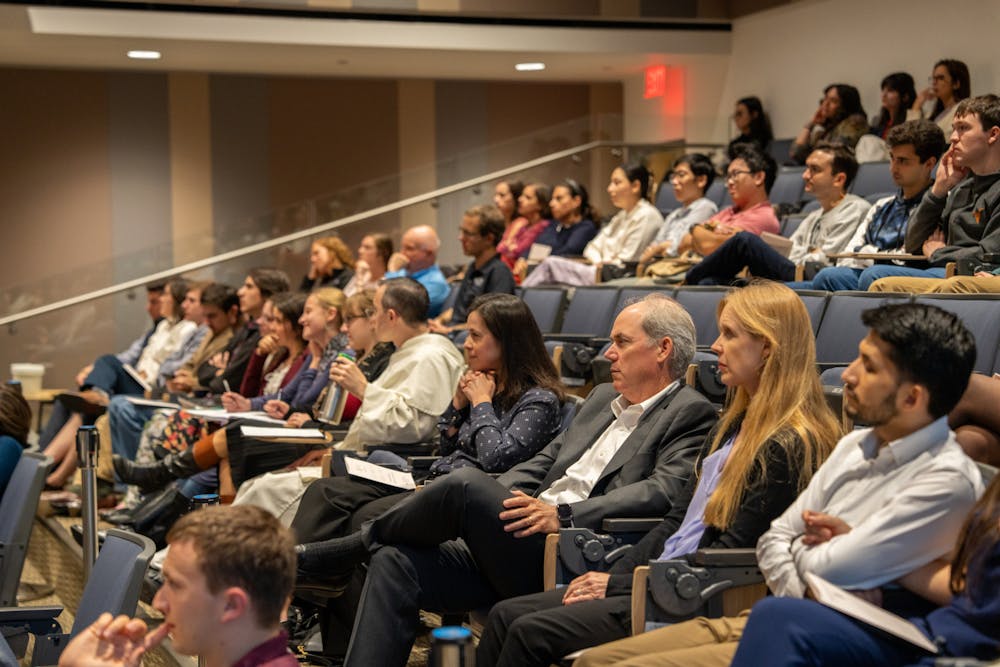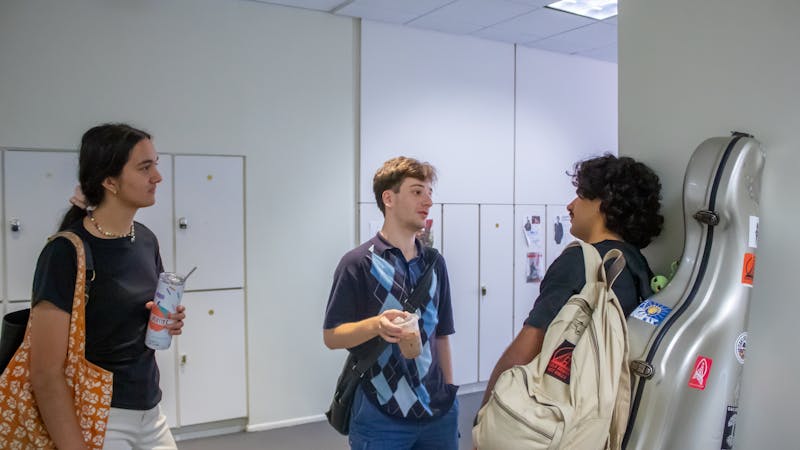Philosophers go head to head on gender

The question of what it means to be a woman is one of the most hotly disputed topics at the moment: Documentaries, research papers, books and hours of YouTube videos have been made on the subject. On the evening of Oct. 16, about 100 people — both Rice students and the greater Houston community — poured into the Hudspeth Auditorium in the Glasscock School of Continuing Studies to watch two philosophers debate gender and philosophy in a discussion titled “Ontology of Gender.”
The event was organized by the Houston Institute, an independent academic non-profit whose mission is to “help the people of Rice University think deeply about the best way to live.”
The two speakers were Louise Antony, a professor emerita at University of Massachusetts Amherst researching feminist philosophy, and Alex Byrne, a professor of philosophy at the Massachusetts Institute of Technology researching perception, sex and gender.
Antony argues for a more complex approach viewing gender as a social construction. In his recent research, Byrne takes the position that a woman is an “adult human female,” a phrase that many activists consider a dogwhistle against transgender women.
“We don’t need to mention the word ‘ontology’ or the word ‘gender,’” Byrne said. “This event is about categories: women, man, girl, boy.”
The debate was organized by Victor Saenz, a lecturer in the Philosophy department at Rice teaching courses in philosophy of religion and ancient Greek philosophy. He also serves as the full-time executive director of the Houston Institute.
“People often have a hard time having deep conversations across ideological lines,” Saenz said. “People don’t get a lot of opportunity and exposure to engage in serious conversations where there is drastic disagreement. One of HI’s values is precisely to promote this culture in a spirit of friendship.”
Antony opened her statement with a personal anecdote from her childhood. As a child, she said she sent in a postcard and won a Tyrannosaurus Rex model kit by answering a quiz question from a local children’s television show, but was denied her prize when the host found out that the kit was going to a girl.
“The host said, ‘That’s not a good prize for a girl, we’re going to send you a Shirley Temple doll instead,’” Antony said. “This is what gender is about. Gender is a socially determined set of expectations about what people are like, what they want, and how they should behave — what they have a right to, based on their actual or presumed personal biological properties.”
In the spirit of the HI’s values, Antony said she hoped to keep her discussion with Byrne civil.
“I think there’s a big appetite outside [academia] for reasoned, respectful discussion of controversial topics, and I hope that Alex Byrne and I modeled that to some extent,” Antony said. “Debate needn’t be adversarial, and at its best is an excellent way to think things through.”
Byrne noted that such debates often do become antagonistic, which he said can discourage people from talking about difficult topics.
“Everyone’s asking about sex and gender these days, but all too often people are inhibited from saying what they think, for fear of giving offense or worse,” Byrne said. “I don’t think there was much inhibition at the debate, partly because the Institute set a very civil tone from the start.
Byrne said that he hoped the debate would encourage other philosophers to interact with those who disagree with them.
“It’s always a pleasure for me to talk to Louise Antony about these issues, because I can learn from her disagreement,” Byrne said. “Disappointingly, philosophers rarely participate in events of this sort, where opposing views on sex and gender can be freely discussed. I’m keen to do my part to change this.”
Attendee Jack Miller said that people from across the political spectrum went to the discussion.
“There was a mix of people in attendance at the debate and the general view was split between the more conservative and the more liberal view,” Miller, a Sid Richardson College sophomore, said. “There was one lady in particular sitting behind me who didn’t do a very good job at maintaining the calm spirit of intellectual discourse, and she made a couple of rude comments. But besides that, everyone engaged well and it shows that there is a positive spirit for discourse, especially amongst Rice students.”
More from The Rice Thresher

Over 1,000 students petition against new meal plan
When Konstantin Savvon opened the Housing and Dining email announcing the new unlimited meal plan, he was instantly concerned about the impact on off-campus students like himself.

Rice shuttle bus drivers reflect on changes and connections behind the wheel
Martine Stewart has spent the past year behind the wheel of Rice’s greater loop shuttle, circling the inner campus from the early morning to late afternoon. She said she has come to recognize many of her regular riders – not just their faces, but the exact spots where they wait to be picked up.

Music majors at Rice’s Shepherd School tackle busy schedules, future goals
Cirdan Vonnahme began playing the cello at 4 years old. After winning his first competition at 11 and debuting with an orchestra, he realized he wouldn’t mind playing the cello for life.

Please note All comments are eligible for publication by The Rice Thresher.